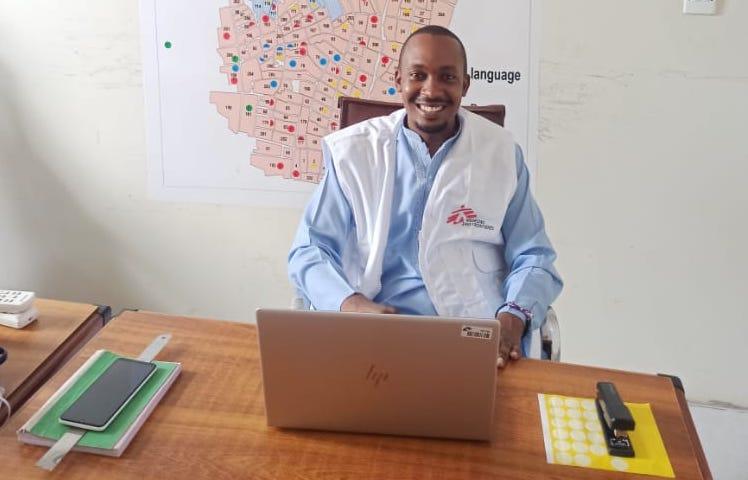Changing people’s lives in the smallest way possible is what got me interested in doing humanitarian work and inspired me to join Médecins Sans Frontières (MSF). I joined the organization in 2012 after a friend shared with me a job opening which was similar to the one I held at the time. I have since worked with MSF in different capacities and in different countries starting off from Homa Bay in Kenya, Malawi, Nigeria, Mozambique and now in Pakistan.
I have specialized in health promotion and community engagement. In Pakistan, we are currently working on a hepatitis C project. Pakistan has the highest number of hepatitis C infections worldwide. The program we are working on is called Bending the Curve (BTC), and our main objective is to help reduce the number of Hepatitis C infections and deaths in an informal settlement in Karachi called Machar Colony. People living here have limited access to quality healthcare. The proportion of people infected with Hepatitis C in Machar Colony is high, almost three times the proportion of infections in Pakistan.
In Machar Colony, we are conducting free mass screening of the population and the positive cases are then referred to the MSF Hepatitis C clinic for free diagnosis confirmation and treatment. We are currently documenting our progress around Bending the Curve of Hepatitis C by doing operational research. We screen the people in the community in small vehicles called bolans. In addition, we are working with Ministry of Health in order to integrate Hepatitis C medical care in a primary health care facility in Baldia town, Keamari district in Karachi Division. Furthermore, the health promotion team works on sensitization not only of the general population but also of specific groups with a high risk of getting infected. The health promoters also conduct community engagement sessions to raise awareness on how to prevent the transmission of hepatitis C. The activities make the people mindful of the disease and this helps in reducing the spread of the disease.
I rely on a supportive team of nurses and health promoters to execute our daily tasks, including mobilising and screening the community members.
Efforts are made to reduce the number of infected patients and the mortality related to the disease. The Hepatitis C model of care that we are proposing can be easily replicated in many other different contexts and this could contribute to reducing the incidence and the prevalence of the disease in the Country.
Through all these efforts, we are trying to show that hepatitis C can be controlled, infections and deaths can be reduced, and that the treatment is effective.
In Nigeria, we were doing a sexual violence project. We used the radio a lot as it is one of the most effective means of mass communication. We had radio programs on different radio stations to create awareness about sexual violence and free MSF services. We also created awareness in primary and secondary schools, universities, religious institutions, marketplaces and public transport (rickshaws, motorcycles, buses). What encouraged me in this project was how one sexual violence survivor who was treated and offered psychological support by MSF, later became an advocate for ending sexual violence in her area. She managed to cope with the situation with the help of MSF and later became a voice for those who had been sexually assaulted and those who were afraid to come out. This really had a big impact on me.
Working in some of these contexts could be challenging at times and therefore requires the spirit of volunteerism. I remember in Mozambique, due to the conflict in the country, there was fighting, and many people were killed in various brutal ways. This drained me psychologically, physically and emotionally. Back in Nigeria, I would think a lot about how people would sexually assault young girls. This took a toll on me considering I have a young child. I would wonder if such a case would also happen to my own child. I later focused on outreach activities to overcome these issues.
Despite the challenges, some experiences will count as real humanitarian work, restoring hope to the most vulnerable people. One time in Mozambique, we came across a mother with a one-year-old child who was emaciated due to diarrhoea and vomiting (cholera suspect). We found her when we were doing an exploration in a community that had been cut off from accessing health services. One of our doctors examined her on-site and found out that the child was critically ill and referred her to our clinic. The family had lost hope, waiting for the child to die and was hesitant to our suggestion since they did not know us, but a community leader whom we were working with, managed to convince them. We got to the clinic and the child was attended to by our doctors.
Two days later, I came across the family being discharged, and the child was laughing. This was extremely fulfilling. The parents were glad and I could see how happy they were. I appreciated the impact MSF has on people’s lives.
My work mostly involves interacting and working with the local communities and this is what I enjoy most. The exposure to different people in different contexts has also taught me to appreciate other people’s cultures, beliefs and ways of life. The diversity of humanity is beyond interesting.
